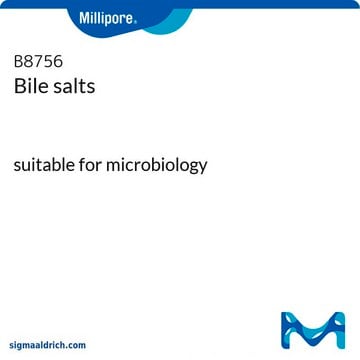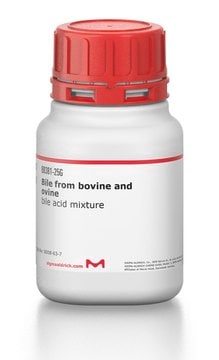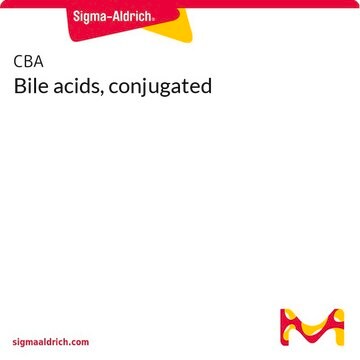B8631
Bile extract porcine
Synonyme(s) :
Bile acids, Hog Bile Powder
Se connecterpour consulter vos tarifs contractuels et ceux de votre entreprise/organisme
About This Item
Numéro CAS:
Numéro CE :
Numéro MDL:
Code UNSPSC :
12352202
Nomenclature NACRES :
NA.25
Produits recommandés
Source biologique
Porcine
Niveau de qualité
Forme
powder
Technique(s)
microbiological culture: suitable
Application
Bile extract porcine has been used:
- as a supplement in brain heart infusion (BHI) medium to culture Listeria monocytogenes LO28
- to investigate the survival of probiotic bacteria through the gastric-small intestine
- as a supplement in BHI mediato study the effect of oxygen on bile resistance in Listeria monocytogenes
Actions biochimiques/physiologiques
Bile from bovine and ovine can be used in bacteriological research to investigate bile salt adaptation of bacteria such as Lactobacillus.
Qualité
Contains glycine and taurine conjugates of hyodeoxycholic acid and other bile salts.
Méthode d'analyse
Chemical derivatization and HPLC have been proven for separation and identification of complex mixtures of bile acids and bile acid conjugates.
Code de la classe de stockage
11 - Combustible Solids
Classe de danger pour l'eau (WGK)
WGK 3
Point d'éclair (°F)
Not applicable
Point d'éclair (°C)
Not applicable
Équipement de protection individuelle
Eyeshields, Gloves, type N95 (US)
Certificats d'analyse (COA)
Recherchez un Certificats d'analyse (COA) en saisissant le numéro de lot du produit. Les numéros de lot figurent sur l'étiquette du produit après les mots "Lot" ou "Batch".
Déjà en possession de ce produit ?
Retrouvez la documentation relative aux produits que vous avez récemment achetés dans la Bibliothèque de documents.
Les clients ont également consulté
Cecilia Tullberg et al.
Food & function, 7(3), 1401-1412 (2016-02-04)
In this work, we investigated lipid oxidation of cod liver oil during gastrointestinal (GI) digestion using two types of in vitro digestion models. In the first type of model, we used human GI juices, while we used digestive enzymes and
Armando Hernández et al.
AMB Express, 9(1), 66-66 (2019-05-19)
This study was undertaken to investigate the impact of culture pH (4.5-6.5) and temperature (32-37 °C) on the stress resilience of Lactobacillus reuteri DSM 17938 during freeze-drying and post freeze-drying exposure to low pH (pH 2) and bile salts. Response-surface methodology
Cristina Tudor et al.
Nutrients, 12(1) (2020-01-02)
Sea buckthorn oil, derived from the fruits of the shrub, also termed seaberry or sandthorn, is without doubt a strikingly rich source of carotenoids, in particular zeaxanthin and β-carotene. In the present study, sea buckthorn oil and an oil-in-water emulsion
Diana Serra et al.
Nutrients, 12(12) (2020-12-03)
Dietary polyphenols are multi-target compounds that have been considered promising candidates in strategies for the mitigation of neurological diseases, acting particularly through reduction of microglia-driven neuroinflammation. In this study, an anthocyanin-rich extract obtained from Portuguese blueberries was subjected to a
Gabriele Rocchetti et al.
Antioxidants (Basel, Switzerland), 9(4) (2020-04-10)
In this work, different commercial extra-virgin olive oils (EVOO) were subjected to in vitro gastrointestinal digestion and the changes in bioactive compounds were evaluated by ultra-high-pressure liquid chromatography coupled with quadrupole-time-of-flight mass spectrometry, using untargeted metabolomics. As expected, raw EVOO
Notre équipe de scientifiques dispose d'une expérience dans tous les secteurs de la recherche, notamment en sciences de la vie, science des matériaux, synthèse chimique, chromatographie, analyse et dans de nombreux autres domaines..
Contacter notre Service technique













